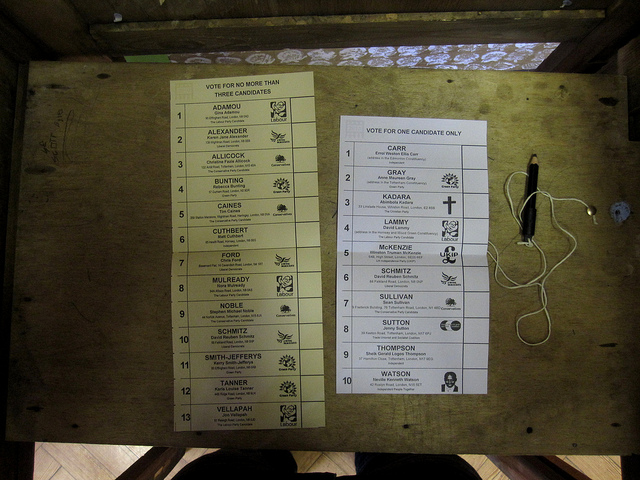The 2015 General Election was further proof that First Past the Post is not fit for purpose
The 2015 General Election produced an unexpected majority government, however it did so despite the rise of smaller parties such as the Greens and UKIP, who between them only won 2 seats, despite polling around 5 million votes. Chris Terry and Jess Garland argue that the result shows that the First Past the Post electoral system is now chronically out of date, with territorial and cultural divisions being hardened by a crude, majoritarian system.

Credit: Mathew Wilson, CC BY NC SA 2.0
The 2015 general election once again underlined the multitude of problems with Britain’s electoral system.
For the third election in a row, no party won more than 40%, let alone a majority of the vote, yet the Conservative Party won 50.9% of the seats for its 36.9% support.
Yet this headline figure hides several other major anomalies. UKIP won 12.6% of the vote and just a single seat. Meanwhile the Liberal Democrats won 7.9% and eight seats. The Green Party won 3.8% of the vote and one MP, while the SNP secured 4.7% of the vote and 56. Clearly, people’s votes bear little relation to the number of seats won.
These disproportionalities aside, the unfairness of the system can be seen in the 25.7 million people who we, at the Electoral Reform Society, estimated lived in safe seats earlier this year It can also be seen in the approximately three million people who felt they had to vote tactically, or the almost three quarters of votes which were wasted in this election – i.e. they didn’t contribute to electing an MP.
More locally, constituency results continue to be absurd. Only 24.5% of voters in Belfast South voted for the winner, the SDLP’s Alastair McDonnell – setting a new record for the lowest ever vote share for a winning candidate. All in all, 332 MPs were elected on less than half the votes in their constituency.
But Britain’s First Past the Post the electoral system does not just result in national inequities. It is also increasingly threatening to pull the UK apart. Each of the four nations of the UK was won by a different political party for the first time in history – each party being disproportionately over-represented within that region.
For its 50% of the vote, the SNP won 95% of the seats, with Labour, the Conservatives and Lib Dems winning just one MP each North of the border. While it is indeed the case that the Conservatives are less popular in Scotland than in England, 14.9% of Scottish voters did support them. This would equate to 9 MPs under d’Hondt PR. At the same time, Labour won just eight seats (of 139) in the South East and South West of England regions despite 1.3 million people casting votes for the party in this area.
In doing so, the system exaggerates differences and divides across the UK. It also has ramifications for the relationship between parties and regions themselves. MPs pass on the views of their constituents into policymaking and day-to-day party stances in Parliament. Without representation in Scotland, parties will find it more difficult to correctly represent views across the Union. What’s more, who can speak to, as well as for, Scotland in the unionist parties? Or the same for the South of England for Labour, or the urban metropolises for the Conservatives. Our electoral system threatens to continue to divide the UK more and more as its effects on political parties continue to artificially exaggerate the divides between the nations and regions of the UK.
Britain’s First Past the Post electoral system is thoroughly out of place for the society in which we now live. The rise of UKIP and the Greens has seen two parties, which together won more than five million votes, only win two seats. It has seen further inequities and anomalies in our election results – and it may be further exaggerating the political differences between the regions and the nations of the UK.
—
Note: This article gives the views of the author, and not the position of the Democratic Audit UK, nor of the London School of Economics. Please read our comments policy before posting.
—
 Chris Terry is a Research Officer at the Electoral Reform Society
Chris Terry is a Research Officer at the Electoral Reform Society
 Jess Garland is Policy and Research Officer at the Electoral Reform Society. A former Senior Political Adviser, she has spent six years working in Parliament for Shadow Ministers and MPs. Jess is responsible for policy and research development for the Society. She has a Research Masters in Government, Policy and Politics and was formerly Chair of a youth-led volunteering charity.
Jess Garland is Policy and Research Officer at the Electoral Reform Society. A former Senior Political Adviser, she has spent six years working in Parliament for Shadow Ministers and MPs. Jess is responsible for policy and research development for the Society. She has a Research Masters in Government, Policy and Politics and was formerly Chair of a youth-led volunteering charity.





 Democratic Audit's core funding is provided by the Joseph Rowntree Charitable Trust. Additional funding is provided by the London School of Economics.
Democratic Audit's core funding is provided by the Joseph Rowntree Charitable Trust. Additional funding is provided by the London School of Economics.
The 2015 General Election was further proof that First Past the Post is not fit for purpose:
https://t.co/J8S4AgoP4R
harryfear: RT electoralreform: #GE2015 was further proof that FPTP is not fit for purpose https://t.co/uAQPrWQrZg… https://t.co/qgBfpVSebR
annanwha: RT modstudies: #GE2015 was further proof that FPTP is not fit for purpose https://t.co/uAQPrWQrZg #Mode… https://t.co/2St8pu8JaV
ge2015bot: modstudies: #GE2015 was further proof that FPTP is not fit for purpose https://t.co/uAQPrWQrZg #Modern… https://t.co/lHkMSpYS9Y
modstudies: #GE2015 was further proof that FPTP is not fit for purpose https://t.co/uAQPrWQrZg #ModernStudies https://t.co/GX89VAU3jN
#GE2015 was further proof that FPTP is not fit for purpose https://t.co/08Q5N7GAsI #ModernStudies
Article that sums up the various ways in which first-past-the-post distorts and undermines UK democracy: https://t.co/Ki5EtnPEUQ #GE2015
fbreckels: RT electoralreform: #GE2015 was further proof that FPTP is not fit for purpose https://t.co/uAQPrWQrZg… https://t.co/O20hfXToev
ge2015bot: electoralreform: #GE2015 was further proof that FPTP is not fit for purpose https://t.co/uAQPrWQrZg CJ… https://t.co/y10VyQFF9Q
RT @electoralreform: #GE2015 was further proof that FPTP is not fit for purpose https://t.co/C0xhGyx4aA @CJTerry and @JessicaJGarland write …
#GE2015 was further proof that First Past the Post is not fit for purpose: https://t.co/ChiBdwSmem from @cjterry and @electoralreform
Democratic Audit UK – 2015 General Election was further proof that First Past the Post is not fit for purpose
https://t.co/aoTb1MYnmG
You’re assuming that the function of the Commons is to provide virtual representation. However, not everyone agrees that such is the sole or proper function of the lower chamber in a parliamentary system. The traditional British approach to this question is that inasmuch as the distribution of seats in the Commons determines the composition of the government, and inasmuch as Britain has traditionally viewed coalition governments as undesirable from an efficiency perspective, then the admittedly disproportional electoral system that produces single-party governments was preferred, warts and all. This choice was made a long time ago. So, the question of Britain’s election system is not one of mathematics but one of philosophy. Of course it distorts the vote-to-seat equation — that’s its purpose. Once the philosophical decision has been made that coalition governments are to be avoided, then all else follows logically. What you are arguing for, then, is not a different election system, but a different governmental system. I’d rather have a political system that has had 25 cabinets since 1945 (Britain) than one that uses PR and has had 66 cabinets since 1945 (Italy). But perhaps that’s just me.
Your analysis of FPTP is of course correct. And although you don’t say as much, I’m assuming that as ERS representatives you believe that PR is not only the one true solution to the problem but that is also actually achievable in the current landscape.
But any honest analysis of that landscape reveals all calls for PR to be a total waste of time as things stand. The very structure of FPTP ensures its continuation unchallenged as only direct beneficiaries of it can ever call the shots. Why would they change it?
It can always be argued that, as undemocratic as it is, FPTP is ‘democratic enough’ as it always delivers a majority of seats one way or another, which is the whole point in a parliamentary system. For this reason, it doesn’t matter how many people are calling for PR – it’s never going to happen, not until something else shifts first.
Luckily, just such a shift could occur, if reformist efforts were refocused in the right place. See my recent interview on RT’s ‘Going Underground’ show for more on that: https://www.youtube.com/watch?v=CvTfeGcW9is
True! There is a #democratic deficit. #FirstPastthePost is not fit for purpose https://t.co/Y3UK4jmPTK
‘…is not chronically out of date’ in your standfirst should surely be ‘…is now chronically out of date’
The 2015 General Election was further proof that First Past the Post is not fit for purpose https://t.co/J4gDKEzPsx
The 2015 General Election was further proof that First Past the Post is not fit for purpose: The 2015 General … https://t.co/vm2nPlM92o
‘votes bear little relation to the number of seats won’ | #GE2015 was further proof of the need for #ElectoralReform https://t.co/upDBkri5FL
The 2015 General Election was further proof that First Past the Post is not fit for purpose https://t.co/dnfqafedjH #Option2Spoil
The 2015 General Election was further proof that First Past the Post is not fit for purpose https://t.co/y0M2xp4a7U https://t.co/TG801ObQNf